When managing a pond, knowing the size of the pond is extremely important when determining how you want to stock your pond, as well as any treatment.
There are many ways to measure the size of your pond, and in this day and age of course the internet can be a great resource.
How to Measure Pond Size
ACME Planimeter is a great resource that enables you to place points around the pond needing to be measured on Google Maps, and will provide the pond measurement in acres.
There are also a couple handy calculations you can use to measure pond size acreage (for both square/rectangular and round ponds):
- Measuring Square/Rectangle Ponds: Multiply length x width, then divide by 43,560 (square feet per acre) (Example: 100' x 150' / 43,560 = .3443 acres)
- Measuring Round Acres: Multiply circumference x itself and then divide by 547,390 (Example: 600' x 600' / 43,560 = .6576 acres)
Importance/Usage of Measuring Pond Size
Pond King will use the size of your pond to determine first and foremost, how to stock your pond. Surface acreage, depth, and structural cover are all important factors when deciding how to stock your pond. At the end of the day, it is up to you as to what you want the goal to be for your pond. The point here is that knowing the size of your pond is vital to caring for your pond environment.
One of the best examples of how pond size can affect stocking, is the stocking of Largemouth Bass. Ponds that are less an acre in size may not be the best for Bass because of the amount of forage required for the Bass. When you have a smaller pond, you want to control the number of fish in your pond, and you want to control their food source.
Bass will be competing for forage if the pond is too small, and that will result in a high number of undersized Bass. The reason for this is the reproduction rate of the bass will not come close to matching the amount of food available.
Smaller ponds are better suited for Catfish and other types of fish that have lower reproductive rates and can be fed utilizing pelleted fish food in a fish feeder. It is all up to what the pond owner would like in their pond, and what their ultimate goal is, but we have found that people more often than not would like a trophy Bass fishery.



